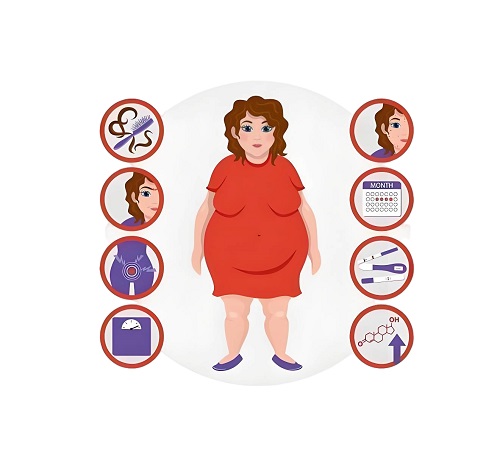Polycystic Ovary Syndrome (PCOS) is a common endocrine disorder that affects many women of reproductive age. Its main symptoms include irregular menstrual cycles, abnormal ovulation, weight gain, acne, and excessive hair growth. Although the exact cause is not fully understood, it is closely related to genetic factors, hormonal imbalances, and environmental influences. Early diagnosis and treatment can help improve symptoms and reduce the risk of complications.

Table of Contents
- 1. Symptoms of Polycystic Ovary Syndrome
- 2. How to Diagnose PCOS
- 3. Treatment Methods for PCOS
- 1. Lifestyle Modifications
- 2. Medication
- 3. Surgical Intervention
1. Symptoms of Polycystic Ovary Syndrome
The symptoms of PCOS vary from person to person, but the most common ones include:
- Irregular Menstrual Cycles: Women with PCOS often experience delayed or absent periods due to irregular ovulation.
- Abnormal Ovulation: Hormonal imbalances prevent the ovaries from releasing eggs regularly, which can lead to infertility.
- Weight Gain: Many women with PCOS have difficulty managing their weight, especially with abdominal fat accumulation.
- Acne: Elevated levels of male hormones (androgens) can lead to increased oil production, causing acne on the face, chest, and back.
- Excessive Hair Growth: Due to high androgen levels, some women experience increased hair growth on the face, chest, back, or abdomen.
2. How to Diagnose PCOS
Diagnosing PCOS generally involves evaluating symptoms, physical examination, and related tests. Common diagnostic tools include:
- Ultrasound: An ultrasound is used to detect changes in the ovaries, such as multiple small cysts, which is characteristic of PCOS.
- Blood Tests: These tests measure levels of male hormones (androgens), insulin resistance, and other hormone levels that may be elevated in women with PCOS.
- Clinical Symptoms: The doctor will combine test results with the patient’s clinical symptoms (e.g., irregular periods, ovulation problems, acne, and excessive hair growth) to make a diagnosis.
3. Treatment Methods for PCOS
The goal of PCOS treatment is to alleviate symptoms, restore normal menstrual cycles and ovulation, and reduce the risk of complications. Treatment methods generally vary based on the patient’s specific situation, including lifestyle changes, medications, and, in some cases, surgical intervention.
1. Lifestyle Modifications
- Healthy Diet: A balanced diet that controls calorie intake, increases fruits and vegetables, and avoids high-sugar and high-fat foods can help maintain weight and improve insulin sensitivity.
- Regular Exercise: Regular aerobic activities (such as walking, swimming, or cycling) can help with weight management, improve insulin metabolism, and promote hormonal balance.
- Weight Management: For overweight patients, losing weight can improve ovulation function and increase the chances of pregnancy.
2. Medication
- Medications to Regulate Menstrual Cycles: Oral contraceptives (combining estrogen and progesterone) can regulate menstrual cycles and reduce menstrual irregularities.
- Ovulation-Stimulating Medications: Drugs like Clomiphene (Clomid) help stimulate ovulation, making them commonly used for infertility treatment in women with PCOS.
- Anti-Androgen Medications: For patients with high androgen levels, medications like spironolactone can help manage acne and excessive hair growth (hirsutism).
3. Surgical Intervention
In some patients, if medication does not yield effective results, surgical intervention may be recommended. This approach is typically aimed at restoring normal hormone levels and improving ovulation. The procedure is minimally invasive, with a quick recovery time, and may be used in certain infertility cases when other treatments have been unsuccessful.
Tips for Patients
Polycystic Ovary Syndrome is a common yet treatable condition. Early diagnosis and individualized treatment are crucial for managing symptoms, restoring ovulation, and improving fertility. If you experience any related symptoms, seek medical advice for a professional evaluation. Through a combination of a healthy lifestyle, medication, and, if needed, surgical intervention, women with PCOS can effectively manage their symptoms and maintain a healthy quality of life.